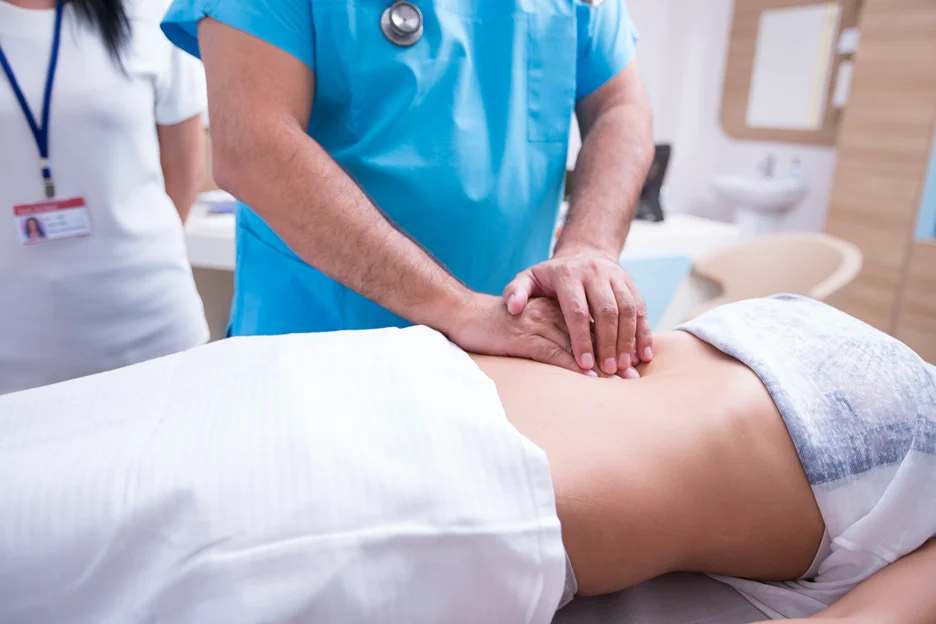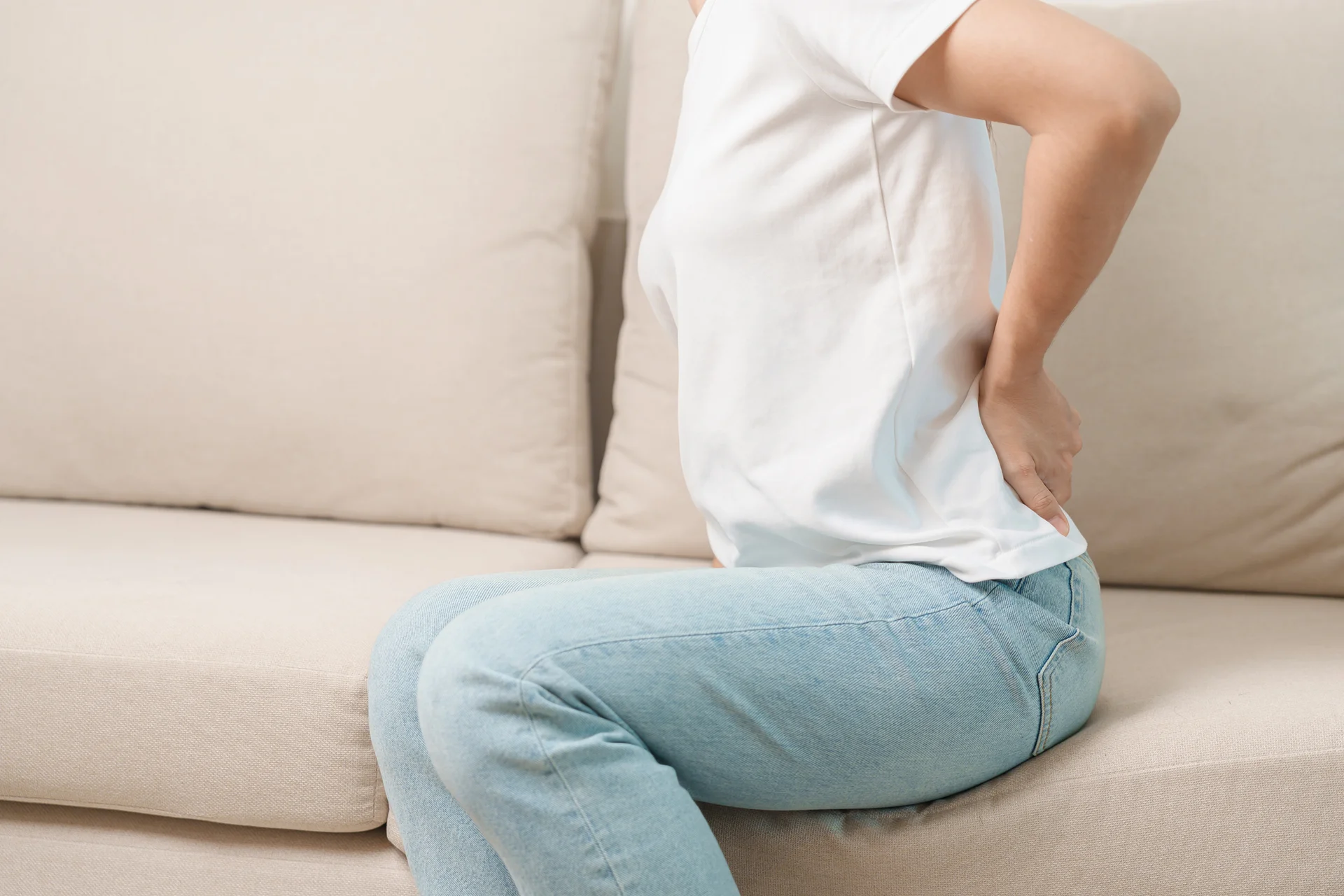Your back pain could be appendicitis in disguise. Learn the subtle clues today.
Is your back aching for no clear reason? Do you have waves of abdominal pain that come and go? There could be more going on.
For one, your back pain could be a sign of hidden appendicitis. It may not seem serious at first, but it can get dangerous before you realize. Learn subtle symptoms to catch it early.
Is There a Connection Between Appendix Pain and Back Pain?

Yes, appendicitis can cause referred back pain that radiates to the lower back through inflammation spreading to the abdominal wall or via nerve pathways linked between the appendix and spinal nerves.
According to Kaly’s experience, while most appendicitis cases cause pain around the navel migrating to the lower right abdomen, some patients experience atypical back discomfort instead.
This occurs when a retrocecal appendix located behind the colon becomes inflamed, potentially radiating pain to the lower back or pelvis.
Spread of Inflammation
The Kaly specialists explain that appendicitis can provoke inflammation irritating the abdominal wall lining, enabling localized pain to spread from the appendix region to the lower back. When the appendix swells, it can cause inflammation of surrounding abdominal tissues.
As this inflammation spreads, it can impact the nerves running through the abdominal muscles and walls, radiating pain signals to the lower back. Careful palpation of the abdominal walls during the examination may reveal tenderness even in remote areas away from the appendix itself.
Shared Nerve Pathways
Additionally, the nerves supplying the appendix connect to the spinal nerves innervating the back. Inflammation can therefore transmit along these neural pathways, manifesting as referred back pain.
Specifically, the dorsal rami nerves serving the appendix also supply sensory branches radiating to the skin and muscles of the back. When these nerve fibers are activated by appendix irritation, the brain misinterprets the signals as arising from the back.
In a study, a 25-year-old man continued having severe abdominal pain after an appendectomy. Examination revealed tenderness over his T11 and T12 vertebrae. Spinal manipulation brought complete resolution, indicating his persistent back pain stemmed from his prior appendicitis.
Discuss your confusing symptoms with knowledgeable appendicitis specialists now. Search with Kaly’s advanced patient-doctor matcher.
What Does Back Pain With Appendicitis Feel Like?
Back pain from appendicitis often starts as a dull, constant ache in the lower back that gradually intensifies, sometimes spreading bilaterally; it differs from mechanical back pain in not improving with typical treatments and arising along with other appendicitis symptoms like abdominal pain, nausea, and fever.
Based on our experience, appendicitis back pain tends to start gradually as a dull ache in the lower back. It may begin on one side but can spread into a generalized backache. The discomfort is often described as:
- Constant and deep rather than acute or intermittent
- Similar to the back pain caused by kidney stones
- Not eased by typical treatments like heat, ice, rest, or over-the-counter pain relievers
As the appendicitis worsens, the back pain often intensifies as well. Pay attention if back discomfort arises along with other appendicitis symptoms.
Associated Symptoms
Other concurrent appendicitis signs may include:
- Fever
- Nausea and vomiting
- Loss of appetite
- Abdominal bloating
- Bowel habit changes like constipation or diarrhea
While not a classic symptom, unexplained back pain warrants medical evaluation to assess for underlying causes like appendicitis.
Where is Appendicitis Pain in the Back Located?
Appendicitis back pain most commonly manifests in the lower back, especially on the right side, resulting from a retrocecal appendix or inflammation spreading to connected nerves; less often, atypical appendix positions cause right flank, pelvic, rectal, or diffuse abdominal pain initially before localizing.
Based on our experience, lower back pain most commonly results from a retrocecal appendix located behind the colon. Inflammation in this posterior region can irritate connected nerves that supply the lower back, causing referred pain on the right side.
Other Atypical Locations
Rectal Pain: Direct appendix inflammation near the rectum can cause rectal discomfort.
Pelvic Pain: In women, an inflamed appendix resting against the right ovary may cause right-sided pelvic pain.
Flank Pain: Rarely, people with an abnormally positioned appendix experience right flank pain.
Generalized Pain: Some patients report generalized abdominal pain initially before it localizes to the right lower quadrant.
What Are the Appendix Symptoms in Female Back Pain?
In females, appendix symptoms may manifest as diffuse abdominal or back pain rather than localized discomfort due to the higher appendix position during pregnancy.
Any unexplained back pain, especially with nausea, vomiting, fever, or appetite changes, warrants urgent evaluation for possible appendicitis.
Uncommon Symptoms in Females
Based on our experience, appendicitis should be considered for any unexplained back pain in females, especially accompanied by:
- Nausea, vomiting, fever, or appetite changes
- Worsening pain with movement
- Intermittent pain that becomes constant
Does Chronic Appendicitis Cause Back Pain?

Yes, chronic appendicitis can cause intermittent lower back pain during flare-ups from referred pain, as the nerves supplying the inflamed appendix also innervate the back; tracking pain patterns helps diagnose this condition, which is definitively treated with appendectomy to resolve chronic back discomfort.
Understanding Chronic Appendicitis
According to Kaly specialists, chronic appendicitis causes recurrent inflammation of the appendix, leading to intermittent abdominal pain over months or years. While not a surgical emergency initially, it can progress to serious complications if untreated.
The abdominal discomfort typically manifests in the lower right quadrant.
Some patients report atypical back pain during flare-ups, especially those with a retrocecal appendix position.
The pain may seem to resolve only to return days or weeks later.
Causes of This Specific Back Pain
Kaly experts explain this back discomfort likely results from referred pain rather than direct inflammation, as the nerves supplying the appendix also innervate the lower back. Carefully tracking the pain patterns can help differentiate chronic appendicitis from mechanical back pain.
- Imaging during a flare can reveal signs of appendiceal inflammation.
- Definitive treatment involves surgically removing the appendix to resolve chronic back pain and prevent future episodes.
- Stay alert to recurrent symptoms and persist in pursuing a diagnosis. Relief from chronic discomfort is possible.
How is Retrocecal Appendicitis Associated With Back Pain?
A retro cecal appendix position behind the cecum is associated with uncommon appendicitis symptoms like back pain rather than classic right lower quadrant discomfort.
Our experts explain that with a retrocecal appendix, inflammation spreads posteriorly along fascial planes, potentially irritating surrounding structures. Direct extension into the psoas muscle can cause lumbar back pain known as the psoas sign.
Additionally, Kaly specialists state that the shared nerve supply between the appendix and lower back facilitates referred pain to the back when the retrocecal appendix becomes inflamed. If an abscess forms, tracking along fascial tissues can further exacerbate the back pain.
Can an Appendectomy Cause Back Pain?
Yes, an appendectomy can cause back pain due to inflammation spreading to back tissues, gas pain from laparoscopy, scarring, exacerbation of pre-existing back problems, or complications like infection. Most patients are advised that they may feel transient pain.
According to Kaly specialists, back pain can occur after you have your appendix removed, though more commonly with open versus laparoscopic techniques requiring larger incisions. The discomfort generally improves within weeks as surgical inflammation subsides.
Based on our clinical experience, the potential causes of post-appendectomy back pain include:
- Local inflammation spreading to back muscles or nerves
- Gas pain from laparoscopy irritating the diaphragm
- Surgical scarring/adhesions tugging on nerves
- Abscesses compressing surrounding tissues
- Worsening of pre-existing back problems
Kaly experts advise that persistent or worsening postoperative back pain may signal complications like infection or hematoma.
Does Appendicitis Pain Go Away and Come Back?

Yes, appendicitis pain can go away and recur in chronic or recurrent cases, likely from transient appendix obstruction; though not an emergency initially, chronic appendicitis causing mild, periodic pain episodes warrants medical evaluation to prevent complications like rupture.
The typical appendicitis pain pattern is constant worsening discomfort as inflammation progresses. However, some patients experience a chronic, recurrent form with milder, intermittent symptoms over weeks to years.
Our clinical experts explain that chronic appendicitis results from partial or transient obstruction of the appendix. Patients may have episodic right lower abdominal pain lasting days at a time, accompanied by nausea, fever, or diarrhea during flare-ups.
While not an emergency initially, Kaly specialists emphasize that chronic appendicitis warrants evaluation to prevent potential complications like rupture.
Mild, periodic symptoms can be misdiagnosed as other conditions. Identifying and surgically treating the source of chronic recurrent pain provides definitive relief.
Worried appendicitis may require surgery? Connect with top-rated laparoscopic surgeons on Kaly for experienced, tried-and-tested care.
